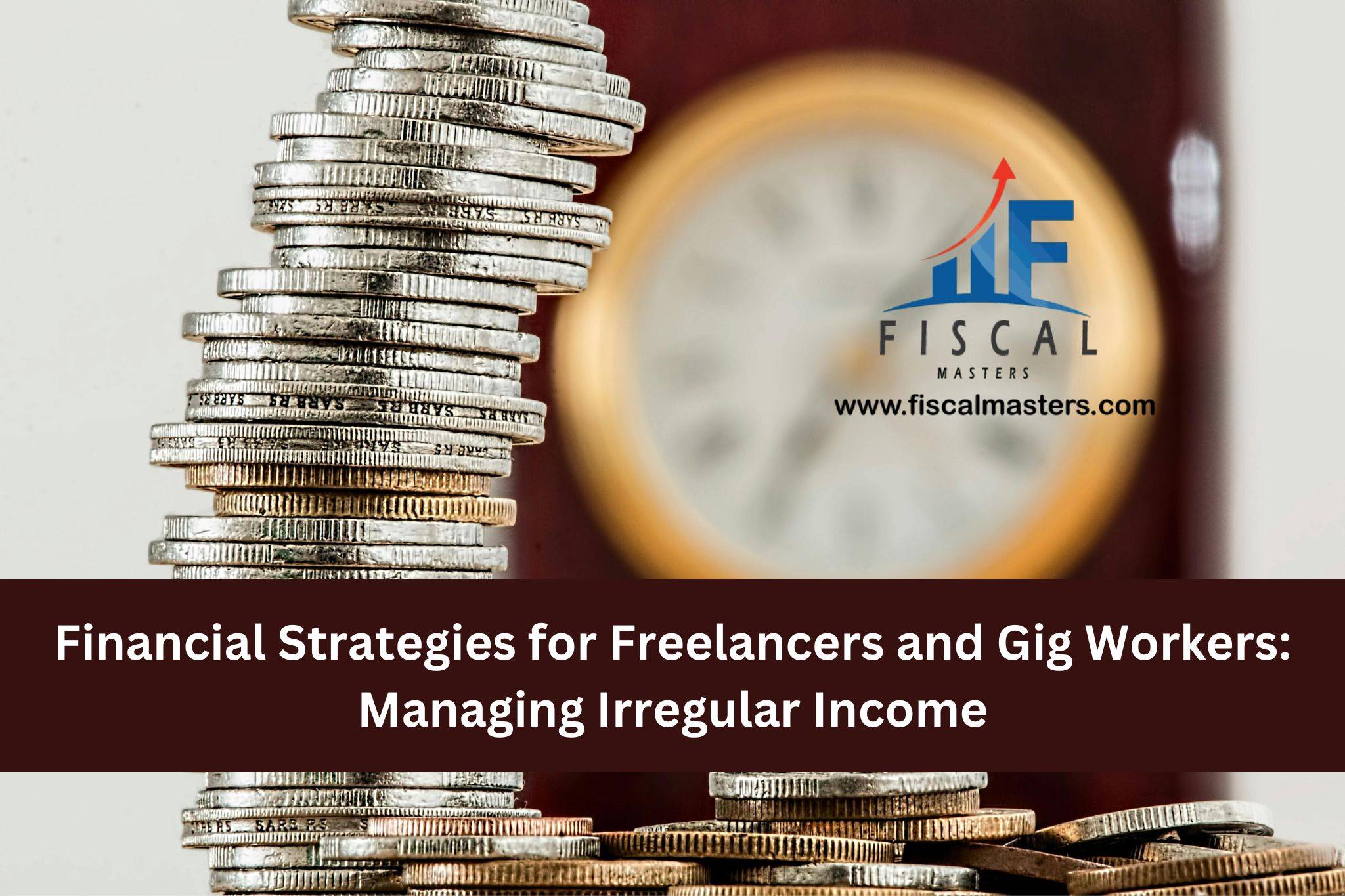You need a financial plan before you make any big decisions in your life. You always need to make one plan. That said, particularly before you embark on anything less predictable, such as being an entrepreneur or a gig worker, you need to understand that there are pros and cons to that.
Financial strategies for freelancers are important to know as they provide financial stability for freelancers. First, you have to have no credit card debt. If God forbid, something goes really wrong, it will grow very quickly.
Read more about: Financial Literacy For Kids: Teaching Money Management Skills From An Early Age
Second, you need to be contributing to retirement and have some way of making sure your retirement does not go to zero. Third and most important, you have to have an emergency savings account. We don’t want you to be leaning on credit cards to finance your life.

Financial Strategies for Freelancers
Balancing finances as a freelancer, irregular income management, and coping with irregular income as a gig worker is important. Here are some financial strategies for freelancers and gig workers’ financial planning.
Save Diligently
Financial strategies for freelancers include the need to create a budget and stick to it even more thoroughly than salaried employees since income tends to be erratic here. Experts say an individual who is freelancing should save and invest at least 25 percent of their average monthly earnings. Also, if you enjoy an extra lump sum monthly income at times, you should save more to compensate for the tough months.
Have a look at: Budgeting Tips for Foreign Students – How to Save Money and Manage your Expenses Abroad
Distribute your money between different savings accounts, labeled for different goals, such as personal investment accounts, capital investment accounts, etc. That way, your money will be allocated every month towards achieving your goals.
However, keep in mind to differentiate and segregate personal and business expenses. This is also among the good financial strategies for freelancers.
Read more: Securing Your Future: A Guide to Retirement Savings
Create a Budget
Unlike a rigid spending plan, a fluid budget adapts to inconsistent or fluctuating income levels. As a freelancer, creating a flexible budget allows you to allocate money as needed each month. Strategies for managing variable income and handling freelancer income fluctuations are important.
First, track your net monthly income based on projects or gigs completed. This is the foundational step in financial strategies for freelancers. Categorize essential expenses like housing, food, and utilities. One of the most important self-employed money tips is to prioritize spending on necessities first when money is tighter.
Know more about: Managing Personal Finances: Ten Tips for Money-Saving to Achieve your Financial Goals
Then, bucket discretionary expenses by importance—key activities versus entertainment. This aspect of gig economy budgeting suggests that when you earn less than usual, you should just spend on necessities. Saving is also important—set aside as much surplus as possible. Build your emergency fund during banner months in preparation for leaner times.
Monitor income and outflows weekly, adjusting variable costs, so you live within your means. Accommodate changing circumstances while still meeting fixed costs.

Emergency Corpus
With freelancing, future earnings are always uncertain. Hence, freelancers need to create an emergency corpus for a rainy day. Generally, an emergency fund is kept equal to 6 months of one’s average monthly expense, which can be built gradually.
Read more : A Beginner’s Guide: How to Start Investing in Stocks and Build Wealth
This money can be parked in an account, where it can be liquidated easily, such as a liquid fund or a sweep in a fixed deposit account. Having cash reserves handles surprise expenses. Also, building a modest emergency stash should be a priority for everyone.
Aim to save enough to cover 6-12 months of fixed costs like rent and health insurance if work dries up. Financial experts suggest starting small if money is tight. Put aside an amount from each check until there is Rs. 50k or Rs. 1 lakh first. This is the best freelance income management strategy for unpredictable times.
Also read: Stock Marketing 101- A Beginners Guide to Make Amazing Informed Financial Decisions
Funnel all windfalls, like tax refunds or extra side gig money straight into savings as a gig worker financial planning scheme. Invest in mutual funds or stocks so they grow over time, which can significantly help you build a large fund. Backup capital means you won’t drain long-term investments or accumulate costly debt when an emergency strikes.

Adequate Insurance
Even though it is not always adequate, one benefit of a regular job is that employees get insurance that covers life and death from their companies. But when freelancing you must ensure you and your family have been adequately covered with personal policies.
Check out: Decoding Digital Currency: The Rise and Future of This Emerging Trend in the Financial Landscape
For instance, buying a term cover early in life can cost you less. People in the 20-30 age bracket should have around 20 times their annual income as insurance coverage; for people in the 30-40 age bracket should have around 15 times their annual income; and around 10 times for those in the 40-50 age bracket.
Also, choose carefully the mode of payment, as the earnings of freelancers tend to change rapidly. Health insurance is possessed by over 304 million people in the U.S.
Read more: Top 10 AI-Based Budgeting Apps For Students To Manage Their Finances
Investment Strategy
If you’ve managed your business according to what you want out of life, avoided lifestyle creep, and kept up with your taxes, you may have some excess funds to invest. It’s important to have financial budgeting tips in mind because that goal will be your north star in your investing decisions. Unlike employees, freelancers owe quarterly estimated income taxes and self-employment taxes.
Balancing finances as a freelancer requires calculating each payment carefully to avoid penalties. Deduct all legitimate business expenses, such as equipment, mileage, home office space, health insurance, retirement contributions, and more. Maintain meticulous records to justify claims if audited.
Learn more about: Mastering Bitcoin Trading: Ten Definitive Tips for Beginners and Seasoned Traders
Set aside a certain percentage from each check for taxes or make quarterly payments. Consider an LLC structure for additional write-offs. Pay taxes on time to avoid interest charges.
For advanced freelance tax planning, consult a tax professional. Their fees are also likely deductible. Explore tax-advantaged retirement plans to shelter more income. Discover any relevant credits or deductions.
Read more: The Rise Of NFTs: Exploring The Intersection Of Art And Crypto
Managing irregular income requires fiscal diligence. But as entrepreneur John D. Rockefeller said, “Do you know the only thing that gives me pleasure? It’s to see my dividends coming in.” Come tax time, file an extension if needed. Use software approved for self-employed filers. Claim all eligible deductions and track them for future reference.

Invest in Yourself and Your Business
Keep gaining new skills like learning financial strategies for freelancers to offer more services and earn more. Put aside time and money for classes, certificates, events and stuff to read about your field. Staying up on the latest tools, ways of doing things, and industry news keeps you competitive.
Reinvest part of every check into your solo business, too. Build your brand with a great website and marketing materials. Get software, collaboration platforms, images, online storage, or anything else that helps you do excellent work.
Check out: http://Read more : A Beginner’s Guide: How to Start Investing in Stocks and Build Wealth
Think about letting virtual helpers do the repetitive administrative or production work so you can take on higher-value projects. Use bots to auto-post on social media and answer simple customer questions when possible.

Taxes
To meet their tax liabilities, freelancers need to budget and save adequately. If one gets a large project that increases one’s income and tax liability, one should also build reserves to meet it.
Experts suggest freelancers should use all means, all deductions, and all exemptions provided by the government to minimize their tax outgo. Having cash reserves handles surprise expenses. Also, building a modest emergency stash should be a priority for everyone.
Read more: Tax-Saving Strategies- How To Maximize Savings For Mid-Level Enterprises
Diversify Income Streams
Relying on a single income source is risky for a freelancer. One lost client or platform change could devastate your livelihood overnight. Building multiple revenue streams makes you more uncertainty-proof by removing dependence on anyone. It’s a strategic move that aligns with sound financial strategies for self-employed workers.
Offer a range of related services to different client types. Once established, branch into creating online courses, eBooks, or video tutorials. Monetize a blog or YouTube following. Sell digital products like templates, stickers, or graphics packs. License your expertise for passive income.
Check out: The Importance of Financial Planning for Education: Ten Saving Strategies to Help You Achieve Your Dream University
Try to work in another field too, like editing, virtual services, or advising. Having different income streams helps to save more and balances things out if a few projects end.
Diversity lets you jump between standalone projects, retainers, hourly contracts, residuals, and everything in between. Also, it helps you navigate the flow of gig economy expenses with confidence. Construct your unique mosaic of income tiles with ideal flow potential.
Also read : A step-by-step guide to cash-saving. Ten Tips to avoid overspending and follow your monthly budget
Sometimes, gig workers and freelancers are surprised by the size of their tax bill. What should they do to prepare? Always think about your taxes proactively. Take out the max, depending on your zip code, and put it in a different account. That’s where we find people get flat-footed. It’s just making sure you’re thinking that through.
